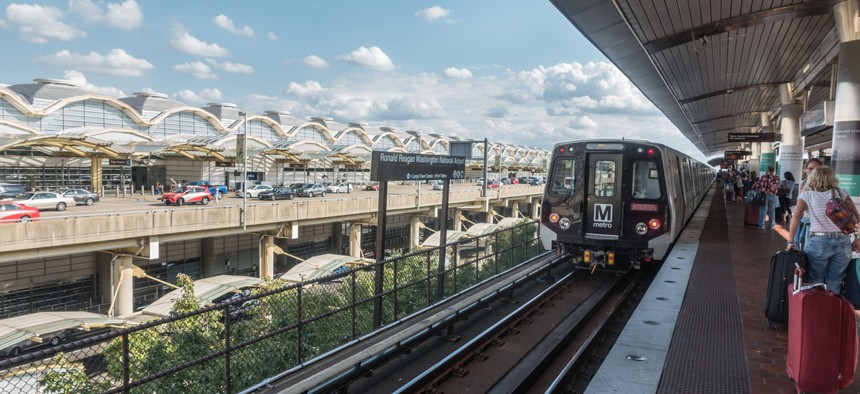OPM Encourages Agencies to Expand Telework Amid Summer Metro Station Closures

Six Metro stations south of National Airport will be closed from Memorial Day through early September. bakdc/Shutterestock.com
Six Metro stations in Virginia will shut down entirely for platform repairs, beginning next week and lasting through early September.
The Office of Personnel Management on Tuesday encouraged agencies to allow federal employees in the D.C. area to use telework more frequently this summer, as a cavalcade of construction threatens to disrupt workers’ commute.
Beginning May 25, the Washington Metropolitan Area Transit Authority, which operates the Metro rail system, will shut down all Blue and Yellow line stations south of National Airport for the entirety of the summer. The closures, which are scheduled to run until Sept. 8, are the first phase in a three-year plan to rebuild 20 outdoor Metrorail stations.
And in July, the Virginia Department of Transportation will shut down the northbound lanes of Route 29 in Fauquier County for three weeks to remove “a series of hills that have contributed to significant crashes” on that highway. That work is slated to run from July 8 until August 2.
In a memo to agencies, acting OPM Director Margaret Weichert encouraged managers to allow those impacted by the station closures to work remotely or use alternative work schedules more often on a temporary basis. In her memo, she stressed the importance of accommodating workers during this project, as agencies had during previous WMATA projects, like the Safetrack initiative in 2016 and 2017.
“Workplace flexibilities made available during the project will assist agencies in retaining their workforce during this time period and will provide stewardship of taxpayer dollars by maintaining continuity of operations,” Weichert wrote.
In a statement, Weichert said she was committed to working with WMATA and federal agencies to minimize the impact on feds in the D.C. area.
“OPM has the best interest of the federal workforce in mind,” she said. “While this project will be an inconvenience for the time being, streamlined communications between WMATA and OPM will help ensure federal employees are able to keep up the same level of service to the American people.”
In guidance accompanying Weichert’s message to agencies, OPM suggested that agencies expand what they consider “portable work” to make more employees eligible for temporary telework agreements during the station closures.
“For employees who may be impacted by the platform improvement project, agencies and managers are encouraged to revisit the question of whether certain portions of the employees’ work are, in fact, consistent with the ‘portable’ types of duties that lend themselves to ad hoc or situational telework,” OPM wrote. “[Managers] have flexibility to work out telework arrangements that take advantage of those days on which the employee is performing portable duties . . . This flexible approach may open up the possibility for telework on a routine or situational basis, even for positions previously thought to be ineligible in their entirety.”
This new push from OPM comes amid an effort at several agencies to cut back on telework. The Agriculture Department last year instructed employees who previously had extensive telework agreements, some even full-time, that they were expected to be in the office four days per week. Other agencies have also pushed to scale back telework during collective bargaining negotiations.
The Agriculture Department did not immediately respond to a request for comment about how it would implement OPM’s new guidance.
NEXT STORY: FCW Insider: May 22






